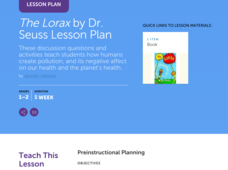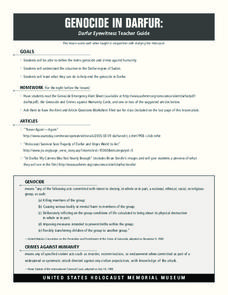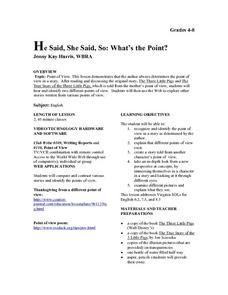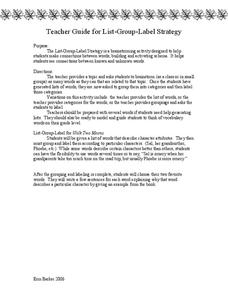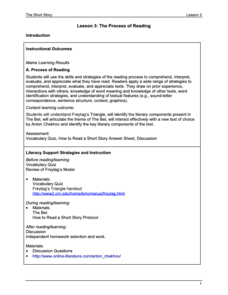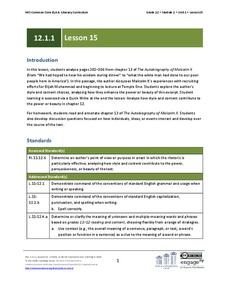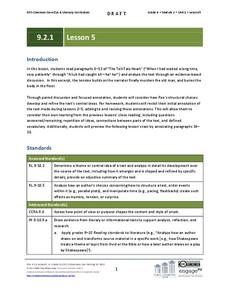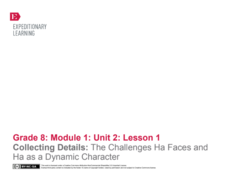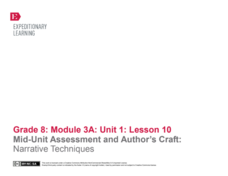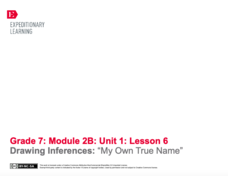Scholastic
The Lorax by Dr. Seuss Lesson Plan
Celebrate the whimsical world of Dr. Seuss with a lesson that features the memorable tale of The Lorax. After listening to a riveting read-aloud, scholars take part in a grand conversation about the story and environment. Then...
Common Sense Media
The Masque of the Red Death
Poe goes high tech with a lesson that asks high schoolers to use the internet and various apps as they read and analyze "The Masque of the Red Death." In addition to responding to comprehension questions in Quizlet, they use Minecraft to...
US Holocaust Museum
Genocide in Darfur: Darfur Eyewitness Teacher Guide
The events of the Holocaust in World War II would never happen again, right? Scholars research the current genocide taking place in Darfur. Using video and Holocaust Reading Passages, they analyze the horror of this forgotten part of the...
Curated OER
He Said, She Said, So: What's the Point?
Not by the hair on my chinny chin chin! Upper graders and middle schoolers read the story The Three Little Pigs and other tales related to the story from various points of view. They use the Internet to find more stories...
August House
Billy Brown and the Belly Button Beastie
How would you feel if you lost your belly button? Read about Billy Brown in Billy Brown and the Belly Button Beastie by Bobby and Sherry Norfolk. Young learners retell the story, answer questions, focus on the letter B and...
Novelinks
Walk Two Moons: List-Group-Label
Use a vocabulary asssignment as a quick activity between reading chapters of Walk Two Moons by Sharon Creech. Young readers choose their favorite words from the vocabulary word list to describe Sal, Phoebe, or any other character from...
Poetry4kids
Simile and Metaphor Lesson Plan
Similes and metaphors are the focus of a poetry lesson complete with two exercises. Scholars read poetry excerpts, underline comparative phrases, then identify whether it contains a simile or metaphor. They then write five...
Chicago Botanic Garden
Climate and Forest Ecosystem Services
Forests, through sequestration, capture excess carbon dioxide in our atmosphere and store it, aiding in climate change. The third installment in a four-part series on how climate impacts forests explores carbon sequestration....
Workforce Solutions
A Colony for Lunar Living
Two lessons explore the possibility of living on the moon. First, scholars read various scenarios to identify which careers would best transfer to life in space. Finally, pupils examine a website to locate items made for outer space,...
Curated OER
Reading Pattern Books
Students investigate pattern books. In this literature lesson, students read the book Brown Bear, Brown Bear What Do You See? and use echo and choral reading strategies. Students identify the pattern in the text and write about the...
Curated OER
The Lion, the Witch, and the Wardrobe: Vocab Squares
Creatively develop and reinforce new vocabulary from the book, The Lion, the Witch, and the Wardrobe by C.S. Lewis, using these vocabulary squares. Each square is divided into four quadrants asking scholars to input the word, a...
EngageNY
Grade 9 ELA Module 3, Unit 1, Lesson 2
Autism isn't an illness or a disability. In the first chapter of Animals in Translation, we learn about Temple Grandin's unique ability to understand animals through her experience with autism. Having read pages four through eight for...
EngageNY
Grade 9 ELA Module 2, Unit 3, Lesson 12
As the first in a two-part, end-of-unit assessment that encourages readers to synthesize the unit's main ideas, class members review their notes for each of the three texts they read and develop three open-ended discussion questions...
PHET
Earth’s Magnetic Field from Space
Feel the pull of science! The final installment of this 18-part series is an application of everything learned in the previous high school lessons. Scholars are given a magnetic field map and must propose an arrangement of magnets that...
Maine Content Literacy Project
The Process of Reading vocabulary, literary elements
Cover Freytag's Triangle and examine Anton Chekhov's "The Bet" in this third lesson plan in a series of fourteen based around short stories. Learners take a quiz and discuss Freytag's triangle. They apply the triangle to "The Bet" and...
EngageNY
Grade 10 ELA Module 4: Unit 1, Lesson 4
High schoolers read the final section of E. B. White’s Death of a Pig and examine the impact of the words and tone he used. In pairs, learners discuss their homework from the previous night, answer questions about the text, and write in...
EngageNY
Grade 12 ELA Module 1: Unit 1, Lesson 15
Chapter 12 of The Autobiography of Malcolm X discusses Haley's narrative techniques, mainly how he uses point of view and foreshadowing to build interest and suspense. Class members read and annotate chapter 13 of the text as homework...
EngageNY
Author’s Read: Final Performance Task
Scholars submit their final performance task, a letter to a publisher about an athlete's legacy. As a culminating activity, they share their work with classmates in small groups.
EngageNY
Grade 9 ELA Module 2: Unit 1, Lesson 5
Eager readers have waited a long time, very patiently, for a set of literary analysis lessons that connect text structure to the work's central idea. As ninth graders continue reading "The Tell-Tale Heart," they focus on the central...
K20 LEARN
Ichabod and Brom - Ghostfacers: Credibility and The Legend Of Sleepy Hollow
A headless horseman? Really? A reading of "The Legend of Sleepy Hollow" launches a study of how to use the A-CLAP strategy to determine a story's credibility. Writers employ these techniques to craft their ghost stories and make them...
Curated OER
Pride and Prejudice: Magic Square Activity
Turn Pride and Prejudice into a math activity with a magic squares lesson plan. Kids read nine character traits and pair them to a list of the book's characters in order to complete the activity and find the magic number.
EngageNY
Collecting Details: The Challenges Ha Faces and Ha as a Dynamic Character
What is a dynamic character? Using an interesting resource, scholars set out to answer the question. They create graphic organizers to collect details about character development as they read the novel Inside Out & Back Again. They...
EngageNY
Mid-Unit Assessment and Author’s Craft: Narrative Techniques
Scholars work together to compile a list of things good writers do to perfect their craft and write the ideas on a whiteboard. They then discuss the differences between passive and active sentences and use their knowledge to identify...
EngageNY
Drawing Inferences: “My Own True Name”sl.7.1
How much are you worth? Scholars read text dependent questions, and discuss how the text relates to self worth. They then work with partners by having written conversation to make inferences about the text. For homework, pupils correct...
Other popular searches
- Reading Homework Packets
- Reading Homework Log
- Homework Sheet Reading
- Cloze Test About Homework Stew
- Sight Word Reading Homework
